John Hurrell – 18 January, 2019
The writing of Young-Hae Chang and Marc Voge addresses the viewer directly on a mixture of personal, political and global issues, usually in short phrases that appear very quickly, set out in a Monaco font. The tone is often witty, observant, and sometimes smart-arse. They are like a cheeky letter you might get from a cocky young sibling that contains caustic jokes about your sex life, art career or diet.
Titirangi
YOUNG-HAE CHANG HEAVY INDUSTRIES
Some Graphic Sex, Heavy Drinking, Bloody Violence, and Dirty Language
24 November, 2018 - 24 February, 2019
The flickering strobelike video texts of YOUNG-HAE CHANG HEAVY INDUSTRIES will easily be remembered by those Aucklanders who saw their night-time projections on the side of buildings (organised by Andrew Clifford for Living Room, 2011) or their solo show at Elam in 2010 (at Projectspace B431).
The writing of Young-Hae Chang and Marc Voge usually addresses the viewer (often assumed to be South Korean or American) directly on a mixture of personal, political and global issues, usually in short phrases that appear very quickly, set out in a Monaco font. The tone is often witty, observant, and sometimes smart-arse. They are like a cheeky letter you might get from a cocky young sibling that contains caustic jokes about your sex life, art career or diet, or spits out snide comments on gun ownership, local politicians, bigotry, global warming or an observed suicide.
These works are oddly intimate, and need your total attention, for sometimes their piling up sentence structures get a pinch convoluted. You have to concentrate to follow their staccato rapid fire word-bursts. A few are so fast in their bombardment of language they are impossible to read—being the type of prank that physically assaults the viewer. (Others mischievously have key letters in words missing—and are a bit like Ed Ruscha’s occasional use of hidden letters.)
A few have computerised voices reading the snappy scripts, but usually there is a nightclubby late-fifties jazz combo ambience of drums, bass, sax, piano or accordion, in the background. The monologues have a film noir feel, entertaining with popular expressions that often get wittily turned on their heads. Sometimes they get a bit too ‘show-offy’ where the jokes are overworked.
At Te Uru the fifteen selected works (they’ve made over five hundred since they started in the late nineties) have been allocated to three locations: one a monitor (presenting four works, four and a half minutes long) in the outside street-front window; the second a ‘introductory’ monitor (showing only one work of about seven minutes) downstairs in the space where main show is presented (just inside the entrance); the third a nearby—big—screen (ten works that take an hour to see) in front of some comfy chairs.
Some individual videos are as brief as twenty-four seconds; others are almost nineteen minutes. In most, the black texts, serif free and in caps, appear on a high contrast white field. In the five longest works (all well over five minutes) however, the words are coloured while the backdrops are a starry night sky; the outer brick wall of a building on a snowy morning; a crowded street of shoppers in what seems to be Seoul; an American flag; and the ‘normal,’ eye-watering, white backdrop.
Although the music and stroboscopic movement is an essential component, some of the long videos—especially the vertigo-inducing frenetic ones—might be more successful as conventional printed poetry, or very short novellas, to be read on paginated sheets. As videos they can be arduous and heavy handed—retinally wearisome with the incessant assault of flickering letters.
Here are three, linked up for you to click on.
WANT TO DO GOOD? KNOW HOW TO SHOOT A SEMIAUTOMATIC HANDGUN? 2012
PERFECT VICTORIA, 2004
SO YOU MADE IT. WHAT DO YOU KNOW. CONGRATULATIONS, AND WELCOME!, 2017
Works like WANT TO DO GOOD? KNOW HOW TO SHOOT A SEMIAUTOMATIC HANDGUN? I find a bit crass, as American lack of sensible gun control is (to coin a phrase) an easy target. Such stupidity is too obvious to comment on.
Probably the most interesting work contentwise is MY LIFE AS A BLOODY SHEFFIELD BUTTER KNIFE, which is about Sheffield steel and the blade of a butter knife with a bone handle that is about to fall off. During the fifteen minute narrative it is used to stab somebody in the throat, and so the writing is gruesomely vivid. As the show’s title (and the name of the first video on the large screen) promises.
I personally prefer the other ten works that are much shorter, like the videos these artists presented in Auckland nine years ago. They are well worth going out to Titirangi to see. I like the bold addressing of the viewer, the skating lines of thought that impishly suddenly change direction, their unpredictability.
See what you think?
John Hurrell
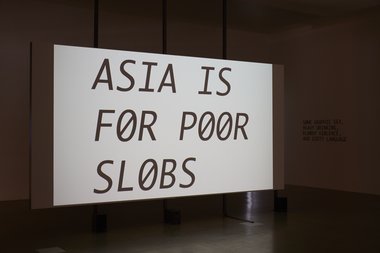
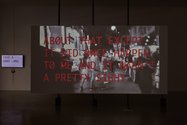
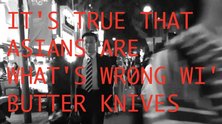
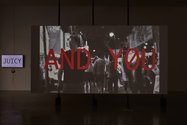
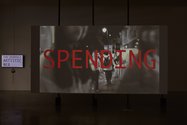
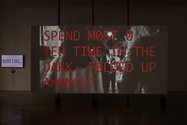
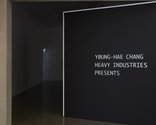
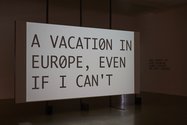
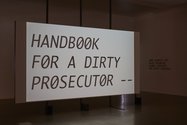
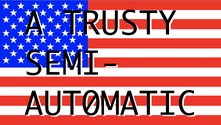
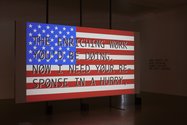
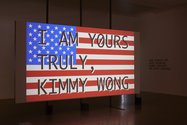
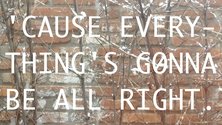
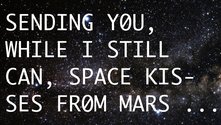
 Two Rooms presents a program of residencies and projects
Two Rooms presents a program of residencies and projects Advertising in this column
Advertising in this column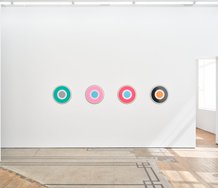
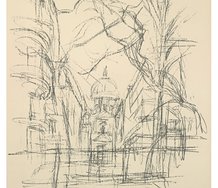

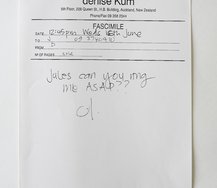
This Discussion has 0 comments.
Comment
Participate
Register to Participate.
Sign in
Sign in to an existing account.